Commercial Solar Installers Green Bay
Best Solar Panels For Businesses in Green Bay
Receive 3 FREE Commercial Solar Installers quotes for your project today! Compare profiles, reviews, accreditations, portfolio, etc... and choose the best offer.

Everlight Solar
4.5852 reviewsVerona, WI, 1155 Ambition St, Suite 100, 53593, USEverlight Solar is a leading provider of solar energy solutions, dedicated to helping homeowners and businesses harness the power of the sun to save money and reduce their carbon footprint. With a team of experienced professionals and a commitment to quality, Everlight Solar offers a range of services including solar panel installation, maintenance, and repair. They are certified by NABCEP and have received numerous awards for their work, including being named one of the fastest growing companies in the US by Inc. 5000.
- Services
- Why Us?
- Accreditations
- Our Team
- Testimonials
- Gallery
Get Quote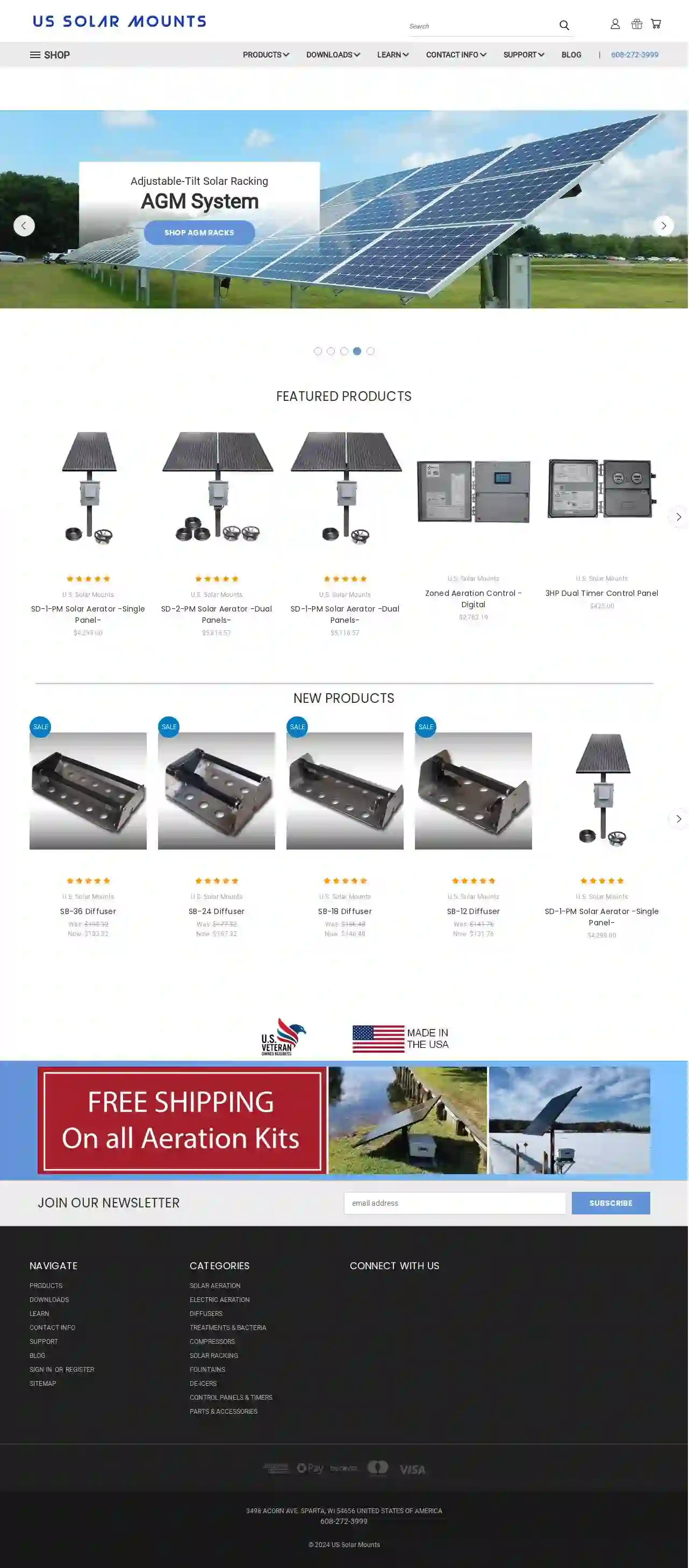
U.S. Solar Mounts Corp
3.73 reviews3498 Acorn Ave., Sparta, WI, 54656, USU.S. Solar Mounts is a leading provider of solar aeration systems, electric aeration, diffusers, treatments, compressors, solar racking, fountains, de-icers, control panels, and timers. They offer a wide range of products designed for various applications, including pond aeration, water treatment, and solar power solutions. Their products are designed to be reliable, efficient, and easy to install, making them suitable for both residential and commercial use. The company also provides resources such as manuals, spec sheets, and FAQs to help customers understand and maintain their products.
- Services
- Why Us?
- Accreditations
- Our Team
- Testimonials
- Gallery
Get Quote
Renew Wisconsin Inc
4.25 reviewsSuite 300, Madison, WI, 214 North Hamilton Street, 53703, USRENEW Wisconsin is a nonprofit organization dedicated to building a stronger, healthier, more vibrant Wisconsin through the advancement of renewable energy. We work on policies and programs that expand solar power, wind power, renewable fuels, local hydropower, building electrification, energy storage, and electric vehicles.
- Services
- Why Us?
- Accreditations
- Our Team
- Testimonials
- Gallery
Get Quote
Endries Solar And Electric
4.923 reviewsUnit 5, Oostburg, WI, 200 S Business Park Drive, 53070, USEndries Solar & Electric is a leading provider of solar products and services. We call the Sheboygan area our home, with our installation territory covering north of Green Bay, the Fox Valley, around Madison and as far south as the Wisconsin/Illinois border.
- Services
- Why Us?
- Accreditations
- Our Team
- Testimonials
- Gallery
Get Quote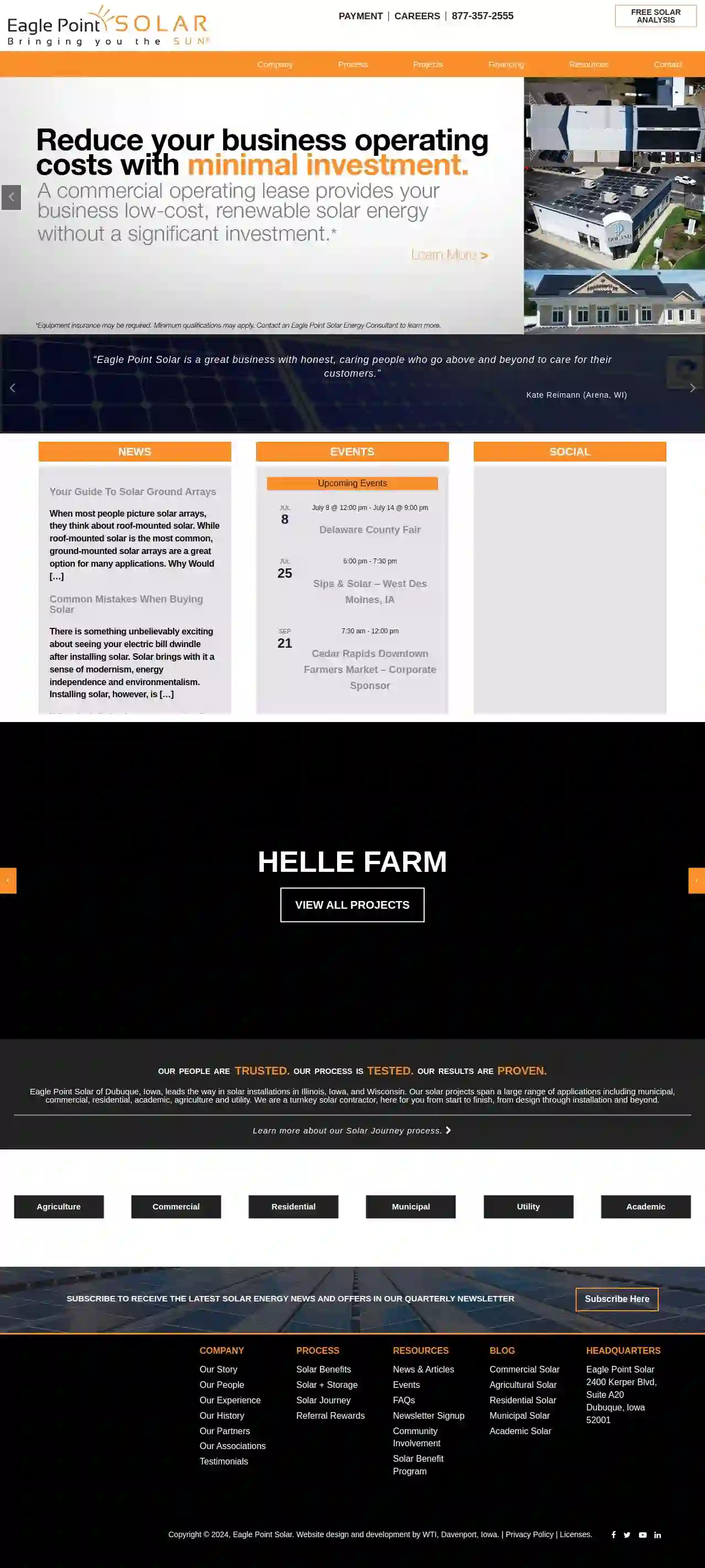
Eagle Point Solar
4.5158 reviews2400 Kerper Blvd, Suite A20, Dubuque, 52001, USEagle Point Solar is a leading provider of solar energy solutions, dedicated to helping individuals and businesses harness the power of the sun. With a strong commitment to sustainability and customer satisfaction, Eagle Point Solar offers a range of services including solar panel installation, solar storage solutions, and solar maintenance. Their team of experienced professionals ensures that every project meets the highest standards of quality and efficiency.
- Services
- Why Us?
- Accreditations
- Our Team
- Testimonials
- Gallery
Get Quote
Au Solar Services LLC
512 reviewsWest Allis, WI, 53214, USAu Solar Services is a certified Enphase Technician providing a range of services including Enphase system servicing, underproduction assessment, critter guard installation, panel removal and reinstall, off-grid solar and storage install, and solar snow guard. With 3 years of experience in the solar industry, a Residential Journeyman Electrician license, Better Business Bureau Accreditation, NABCEP Photovoltaic Associates Degree, Enphase Energy System Certifications, and MREA membership, clients can trust in the highest quality care for their solar systems.
- Services
- Why Us?
- Accreditations
- Our Team
- Gallery
Get Quote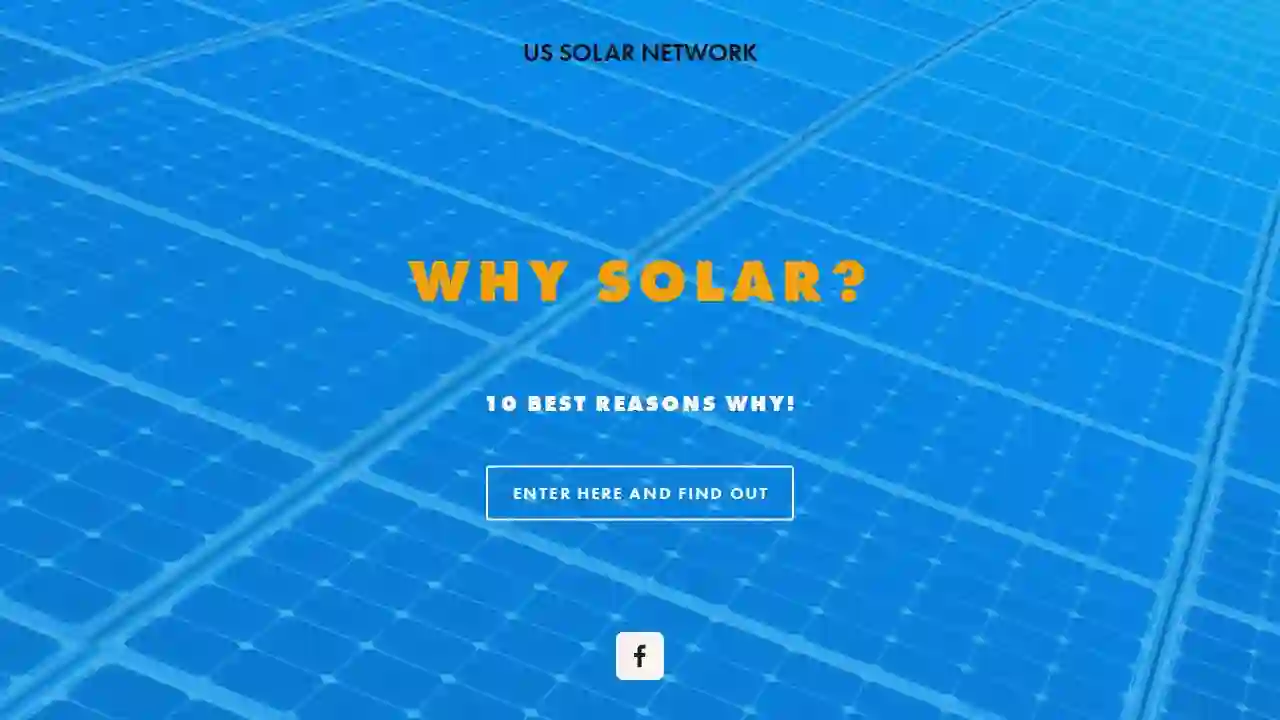
US SOLAR NETWORK
57 reviews123 Solar Street, Suite 100, Solar City, 12345, USUS Solar Network is a leading provider of solar energy solutions, offering a range of services to help individuals and businesses reduce their energy costs and carbon footprint. With a commitment to sustainability and customer satisfaction, US Solar Network provides top-quality solar panels and installation services, ensuring that clients can enjoy the benefits of renewable energy.
- Services
- Why Us?
- Accreditations
- Our Team
- Testimonials
- Gallery
Get Quote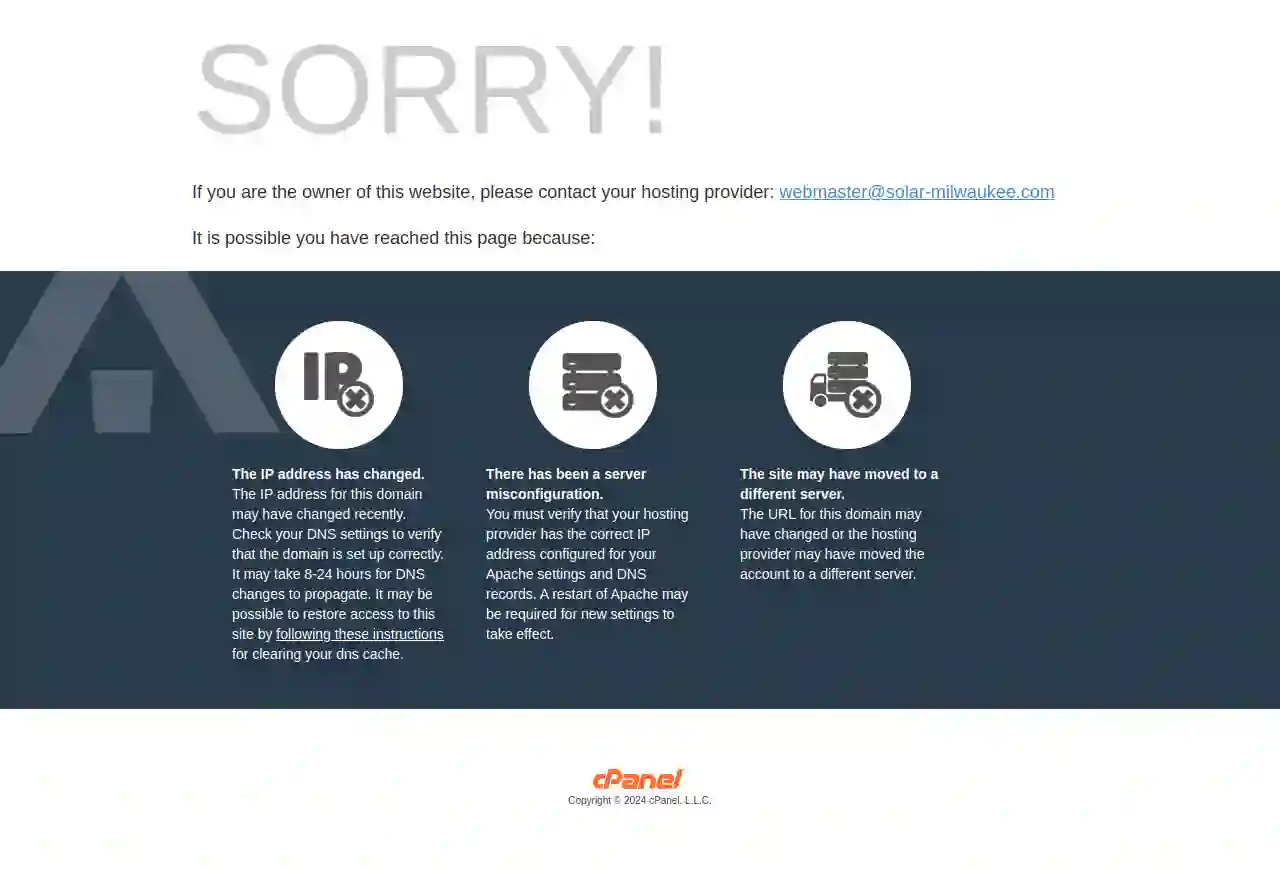
Solar Co of Milwaukee
51 reviewsMilwaukee, Wisconsin, USA, 123 Solar Way, 53202, USSolar Co of Milwaukee is a trusted partner for solar panel installation in the Milwaukee, Wisconsin area. Our network of industry experts specializes in residential and commercial installations, off-grid systems, and energy storage solutions. We are passionate about renewable energy and sustainable practices, providing top-notch service and support from start to finish. Our goal is to help you reduce your carbon footprint and save on your energy bills.
- Services
- Why Us?
- Accreditations
- Our Team
- Testimonials
- Gallery
Get Quote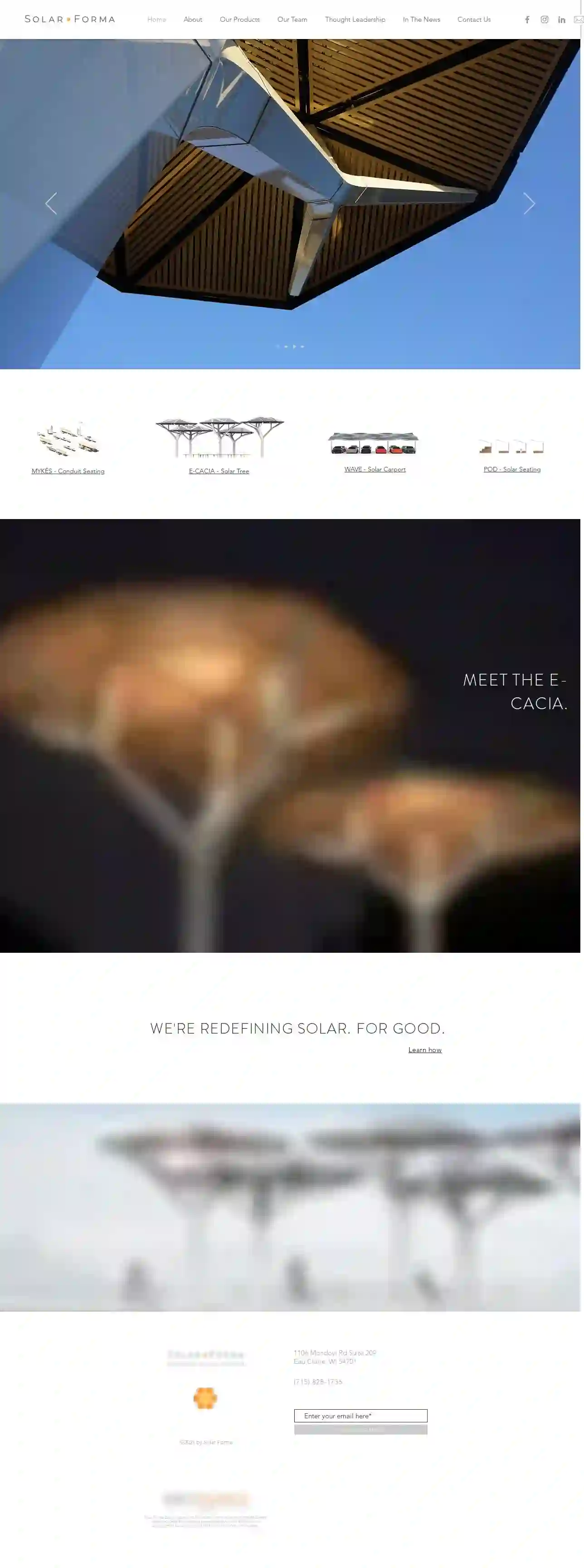
Solar Forma Design
1106 Mondovi Rd Suite 209, Eau Claire, 54701, USSolar Forma Design is a company that specializes in solar-powered products, including the E-CACIA Solar Tree, WAVE Solar Carport, POD Solar Seating, and MYKĒS Conduit Seating. They aim to redefine solar energy for good and have been a grant recipient of the UW System Ideadvance Seed Fund.
- Services
- Why Us?
- Accreditations
- Gallery
Get Quote
Midwest Solars
53 reviewsMondovi, Wisconsin, United States, 910, Countryside Parkway, 54755, USMidwest Solars, a division of Tecom LLC, started in 2019 as a dream between friends. Tom Wingert, owner of Tecom LLC and Andy Van Roo, decided to form a solar company from the ground up in rural Western Wisconsin. The first project was a commercial building owned by Van Roo. Together, they hope to expand renewable energy in the domestic United States. Tom has a wealth of experience and knowledge with solar in Florida and has worked for Tesla Energy and Amazon. Midwest Solars is actively developing multi Megawatt Projects in Wisconsin, Texas, Ohio, Pennsylvania, Virginia, and Vermont. They serve all 50 states.
- Services
- Why Us?
- Accreditations
- Our Team
- Testimonials
- Gallery
Get Quote
Over 4,210+ Solar Installers onboarded
Our solar installers operate in Green Bay and beyond!
SolarCompaniesHub has curated and vetted the Best Solar Installers in and around Green Bay. Find a trustworthy pro today.
Frequently Asked Questions About Commercial Solar Installations
- Location: Areas with high dust, pollution, or bird activity may require more frequent cleaning.
- Panel Angle: Flat or low-sloped panels tend to accumulate more dirt than steeper panels.
- Rainfall: Areas with regular rainfall may need less cleaning, as rain can help wash away some debris.
- Efficiency: Higher-efficiency panels produce more energy from the same amount of sunlight, but they may have a higher upfront cost.
- Space Availability: If you have limited roof or ground space, higher-efficiency panels allow you to maximize energy production.
- Aesthetics: Consider the visual appearance of the panels and how they integrate with your building or surroundings. Monocrystalline panels tend to have a more sleek and modern look, while polycrystalline panels have a more traditional blue appearance.
- Cost: Polycrystalline panels are generally more budget-friendly, while monocrystalline panels tend to be more expensive.
- Durability and Warranty: All types of solar panels are designed to be durable, but some manufacturers offer longer warranties or better performance guarantees.
What is a net metering agreement, and why is it important?
Do commercial solar panels require regular cleaning?
Can I add battery storage to my commercial solar system later?
How do I choose the right solar panel type for my business?
What is a net metering agreement, and why is it important?
Do commercial solar panels require regular cleaning?
- Location: Areas with high dust, pollution, or bird activity may require more frequent cleaning.
- Panel Angle: Flat or low-sloped panels tend to accumulate more dirt than steeper panels.
- Rainfall: Areas with regular rainfall may need less cleaning, as rain can help wash away some debris.
Can I add battery storage to my commercial solar system later?
How do I choose the right solar panel type for my business?
- Efficiency: Higher-efficiency panels produce more energy from the same amount of sunlight, but they may have a higher upfront cost.
- Space Availability: If you have limited roof or ground space, higher-efficiency panels allow you to maximize energy production.
- Aesthetics: Consider the visual appearance of the panels and how they integrate with your building or surroundings. Monocrystalline panels tend to have a more sleek and modern look, while polycrystalline panels have a more traditional blue appearance.
- Cost: Polycrystalline panels are generally more budget-friendly, while monocrystalline panels tend to be more expensive.
- Durability and Warranty: All types of solar panels are designed to be durable, but some manufacturers offer longer warranties or better performance guarantees.